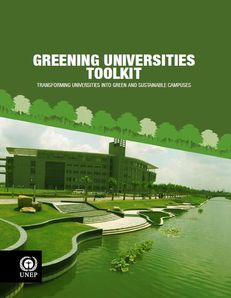As we near the end of the United Nations Decade of Education for Sustainable Development (2005-2014), we are reminded that education is central to UNEP’s mandate of “inspiring, informing and enabling nations and peoples to improve their quality of life without compromising that of future generations. In particular we are reminded that education is not about “doing as I say”, but learning to “do as I do” – given that what we do is pivotal to how the world’s communities deal with the multiple challenges of climate change, resource efficiency, biodiversity protection and management of our growing legacy of waste and environmental pollution.
Universities, as the pinnacle of formal, organised education, thus have a particular responsibility both to help define and also to become exemplars of environmental best practice. The former aspect is generally well understood. Worldwide, Universities teach, conduct research and contribute to the global knowledge base across every aspect of sustainability, from photovoltaic engineering to ecological accounting.
Yet when it comes to the University’s own fabric and operations, there is frequently a significant disconnect… “do as I say” all too often reasserts itself.
The focus of this Toolkit is to help address that gap – to provide University staff and students with a selection of strategies, tools and resources, gleaned from the literature, from global case studies and from practice which are intended to inspire, encourage and support Universities to develop and implement their own transformative strategies for establishing green, resource-efficient and low carbon campuses. In turn, it is hoped the “green campus” will help inform the “green curriculum”, and extending beyond institutional boundaries, help to catalyse more sustainable communities.
About the Toolkit
This Toolkit is part of a wider Greening Universities Initiative established through UNEP’s Environmental Education and Training Unit, in collaboration with other UN agencies, under the umbrella of the recently formed Global Universities Partnership for Environment and Sustainability (GUPES). GUPES brings together over 100 Universities from across Africa, Asia and the Pacific, Latin America and the Caribbean, West Asia, Europe, and North America. At its core is the role Universities can foster for critical thinking, for example on emerging ethics and values towards the next generation of planetary leadership.
We commend this Toolkit to our GUPES partner Universities and the wider global university community, and wish you every success in putting into practice the initiatives expounded therein – while remaining cognisant of the magnitude of the tasks ahead.
In concluding these introductory remarks, it is important to emphasise that this is a living document. Continual qualitative improvement, as distinct from unlimited quantitative growth, is the essence of sustainable development. So we welcome your feedback, examples and case studies for inclusion in the web-based version of the Toolkit, and to update future editions of the published version.







 Except where otherwise stated, content on this site is
licensed under a Creative Commons Attribution 3.0 License.
Except where otherwise stated, content on this site is
licensed under a Creative Commons Attribution 3.0 License.
